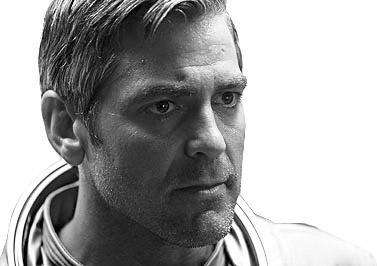It helps to think of “Solaris” as a film about concepts, rather than a concept film. Director Steven Soderbergh’s genre-hopping has brought him to the final frontier, but it’s surprising to see just how little science fiction is in this stylized futura-mindbender.
The themes of creation, life and death outshine anything resembling techno-babble or space travel. Though set in the future, the crux of “Solaris” lies in the past.
The narrative wends in and out of dreams, memories and visions. Central to the film is a poem from Irishman Dylan Thomas and a litany of iconic imagery. One scene reinterprets a “touching” image from Michelangelo’s Sistine Chapel.
“And death shall have no dominion,” was a favorite quote of George Clooney’s psychologist Chris Kelvin and his late wife, Natascha McElhone’s Rheya. But when Kelvin is dispatched to rescue a crew gone mad orbiting the mysterious planet Solaris, Thomas’ poetry takes on a much more literal and perplexing meaning.
“The theme of predestination is crucial,” Soderbergh said in a statement. “Kelvin and Rheya’s relationship ended very badly. When she appears on the Prometheus, they both struggle with the idea of the relationship traveling the same path it did before.”
In fact another line of Thomas’, “When they go mad, they shall be sane,” seems more fitting for Viola Davis’ stir-crazy Gordon and Jeremy Davies’ schizophrenic Snow who see “visitors” from their past.
During his first night on the Prometheus, Kelvin dreams of when he met his wife. This romantic jaunt segues into a full-blown flashback, sweeping through exposition on the exploration of Solaris and Kelvin’s relationship with Rheya.
But when the oceanic membrane on the surface of Solaris offers Kelvin a second chance at love, a chance to heal his crippling guilt, will he take it? Is the past simply our memory? Can we alter it, or are we doomed to repeat its mistakes?
“This film takes you to the farthest reaches of the universe, and what you find there is yourself,” Soderbergh said. “Kelvin is confronted with his own memory, his guilt, his culpability, the mistakes that he made. And he gets the opportunity to change it, or maybe not.”
Having worked non-stop since 1997’s “The Limey,” directing six films and producing countless others, Soderbergh is taking a well-deserved break after “Solaris.” While the photography is gorgeous, the plot tends to sag. Soderbergh’s break-neck speed may be dulling his sharp story-telling instincts.
Like Oscar-winner “Traffic” before it, “Solaris” is a compelling drama with more questions than answers. But it’s not necessarily a film to prompt repeated viewings.
McElhone is first-rate casting as the oval-eyed, Repunzel of a specter, while long-time Soderbergh cohort Clooney is only a passable Kelvin. But Clooney occasionally drags his feet, and original choice Daniel-Day Lewis would have added weight and dexterity to this troubled psychologist who could use a few minutes on the couch himself.
Davies (“Saving Private Ryan,” “CQ”) continues to be a ringer for any film he takes. His Snow is a subdued, finger-waving madcap. Beginning each line with a premeditated, “Yeah…uh…” Davies lightens the mood and saves some longer stretches from turning into celluloid NyQuil.
“Solaris” is neither the “Bounce in Space” the soppy trailers tout, nor the “2001 meets Last Tango in Paris,” Clooney quotes, but somewhere in between and yet lightyears away.
But as Snow tells Kelvin, “There are no answers, only choices.”
Solaris maddening for viewers
December 5, 2002

Solaris maddening for viewers



